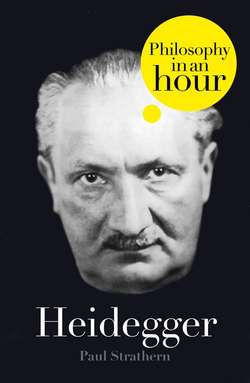Читать книгу Heidegger: Philosophy in an Hour - Paul Strathern - Страница 4
Introduction
ОглавлениеHeidegger may have been the most controversial philosopher of the twentieth century. During the first half of that century the course of philosophy diverged as never before. There became, in fact, two philosophical traditions. These proved so incompatible that no discourse was possible between them. One regarded the other as sheer nonsense. The other regarded the former as having entirely missed the point of philosophy. Any reconciliation was out of the question.
On the one hand was the philosophy of linguistic analysis, which derived largely from Wittgenstein. As its name suggests, this philosophy required extreme rigour in the use of words. Philosophical problems were deemed to arise from the misapplication of words. In such cases, a word was used in a context to which it could not apply – which resulted in the ‘knot’ of a problem. As soon as the knot was untangled by suitable analysis, the problem simply vanished. For instance, take the question: ‘What is the meaning of existence?’ This was a question that simply could not be asked. And why not? Because to apply the term ‘meaning’ to the term ‘existence’ was invalid. For existence to have a meaning, this meaning would somehow have to exist above and beyond existence. But it is impossible for something to exist outside existence. Just as it is impossible for something to be red that is not red, true that is not true. Such analysis explains why there can be no answer to the question: ‘What is the meaning of existence?’
The other tradition of philosophy, which derived from Heidegger, was diametrically opposed to such analysis. Indeed, its fundamental question was: ‘What is being?’ In other words, ‘What does it mean to exist?’ or ‘What is the meaning of existence?’ For Heidegger and the existential tradition, this question could not simply be ‘analysed away’. Such questions were beyond the reach of logic or reason. They lay deeper. Our existence was fundamental: prior to rational thought or linguistic analysis. It was the primary ‘given’ of every individual life.
In order to ask such questions about being, about existence, an entire new form of philosophy had to be developed. This was what Heidegger saw as his lifelong task.
